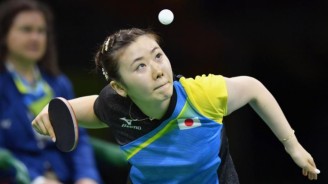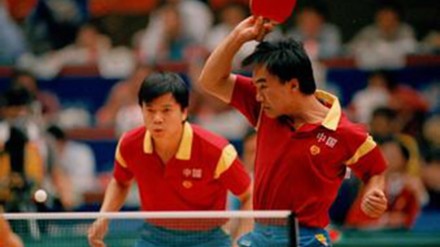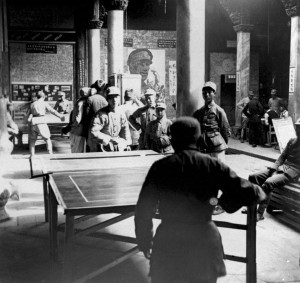Table Tennis is not for the faint-hearted, it is a sport of endurance, stamina and utter focus.
Sports presents itself in all forms and sizes, as an individual of the Western World I was not always aware of the extent of ping-pong. In Australia, I associate ping-pong with the legendary game of Beer Pong and a casual muck around with friends. In China, Table Tennis is the countries biggest sport. China is ranked number 1 in the world and holds the three top seats in the Men’s and Women’s leagues. Of China’s population, it is estimated that there are around 10 million citizens who regularly play the game. During the 2008 Bejing Olympic Games, a solid 300 million people of China tuned in to watch the mega show-down between China’s Table Tennis athletes Ma Lin vs. Wang Hao.
Autoethnography is an approach to research and writing that seeks to describe and systematically analyse (graphy) personal experience (auto) in order to understand cultural experience (ethno). As part of autoethnography, researchers are challenged to participate in their own self-evaluation, this stems from the concept of epiphanies. Epiphanies are remembered moments percieved to have significantly impacted the trajectory of a person’s life. Epiphanies require a level of self-awareness, they reveal the ways and ‘whys’ a person reacts to particular circumstances or situations.
My first step of investigation for my digital artifact was to sit down and watch a clip of the best rallies in table tennis history. My mind was blown by the skill and endurance these athletes have. My next aim was to sit and attempt to watch a full game to get the feel. My past is grounded in tennis, as a former Australian athlete I thought to myself, it really is in essence tennis but on a way smaller level. So I sat down and had a go, after 30 minutes past it was safe to say I was bored. Some people say its because Youtube provided me with an old and ordinary game, but I also think it’s because I had no clue what was going on…..
I researched the rules and training behind the sport and spread my wings to watch a variety of different games at various levels and tutorials. What I found interesting was that undoubtedly each tournament was filled with spectators; views on YouTube videos were consistently more than 400,000+. Interestingly an epiphany popped into my mind, “what makes sport so culturally valuable in society?” “Why do certain countries choose to invest in particular sports?” To narrow down my scope, I researched the history behind the emergence of table tennis in China, why it is a cultural value and to further my own understanding of the game in order to try and value it the same as the Chinese people do.
To validate my epiphanies against Ellis theory of autoethnography – Ethnography is, the study of a culture’s relational practices, common values and beliefs and shared experiences for the purpose of helping insiders and outsiders better understand culture.
As previously stated in my other blog post, China was first introduced to Table Tennis by its former leader Mao Zedong. The sport swiftly became a cultural value of the country, the sport was ‘bizarrely‘ popular amongst the Communist Party of China’s military force during the 1930s. Not long after do we see China using Ping-Pong as a source of diplomacy, this is through the games introduction to the Olympic Games and also communication with other countries.
I found that a brief look into the its history in China and the values that extend past the social norm of sport generate yet another element for my digital artefact. In order to fulfil the criteria of autoethnography, my aim will be to reveal the history of ping-pong in China and explore its globalisation and diplomacy. It will not only allow me to understand the value the country holds for the sport, but also allow me to uncover the hidden agenda government’s hold for sport.



Hey Mia,
I struggled with the auto ethnography task because I kept forgetting the AUTO part. Eventually, after some real difficulty, I started to get that my role in storytelling is equally important as the story itself.
Anyway, sorry to ramble on about me, but it caught my attention how you referenced your brain associating ping pong with beer pong (mine does too).
Although it might seem weird and insignificant at first, I think recognising your brain’s association as a literal role in your own storytelling and experience with ping pong ties into exactly what Ellis is talking about.
“Autoethnographers value narrative truth based on what a story of experience does—how it is used, understood, and responded to for and by us and others as writers, participants, audiences, and humans (BOCHNER, 1994; DENZIN, 1989)” is basically exactly what I’m talking about.
Yeah, it’d be easy to dismiss beer pong as a dumb connection your brain made, but it’s the dumb connection YOUR (and MINE) for this matter that is an integral part of your, and all of our investigations.
Now, let’s play beer pong.
LikeLike
Reblogged this on Digital Asia.
LikeLike
Hi Mia, I really liked how you talk about epiphanies and how they the ways and ‘whys’ a person reacts to particular circumstances or situations. This is integral to remembered and embedded moments that shape the way we approach new ideas and concepts. It was good that you knew how to understand table tennis on a cultural level more thoroughly through investigation and background research to better immerse yourself. I believe a lot of sport comes from a countries culture and passion for how the game came to be and has stuck through the ages. It is fascinating and most interesting to see how a growing love for ping pong in 1930’s communist China also ended up being a popular tool for diplomacy. Usually, sports are seen (in Australia) mainly as competitions through large teams of many playing NRL, AFL, Union and soccer and encourage betting and drinking ads at halftime. The cultural differences are so parallel! I am interested in your next post about table tennis and its origins.
LikeLike
hi mia!
i’m kinda relate to you in that I think table tennis itself is kinda boring too, but the history and culture around it is pretty fascinating! even if you just walk around campus you can see the huge popularity of ping pong amongst international students. you can see the occasional group of australians using the ping pong tables in the unicentre, but the biggest users of those ping pong tables are chinese international students. the biggest turn out for the ping pong events on wednesday night run by unilife are also almost always consistently chinese students. it’s kinda interesting that we can feel so removed from something like ping pong’s massive influence in china but at the same time observe that influence right in front of us in a shared space on campus. the more i think about the influence (or simply existence, i guess) of asian culture outside asia and here in australia the more of these kinds of epiphanies i have.
i think your point on ping pong as a means of diplomacy is an in interesting one too! outside of playing ping pong once or twice at the unicentre, my only other experience with the sport is two films i watched when i studied in japan last year. one was kinda old and simply called ‘ping pong’, and the other was called ‘mix’ and was released last year. both of these films are japanese, and the main characters are ping pong players. the interesting things is though that in both films the main antagonists are from china. ‘ping pong’ is a slightly more serious coming-of-age type film, and it really frames the rival chinese ping pong player as a vicious enemy. japan and china have a lot of dark history between them, and it’s kind interesting to see remnants of this seep into films about ping pong because of the heavy association with ping pong and the chinese. when you consider all the cultural and historical baggage between china and japan those films because much richer with meaning i think! if you’re interesting in watching ‘mix’ by the way, it’s showing at the japanese film festival in sydney in november!
LikeLike